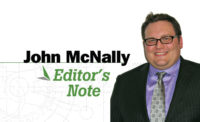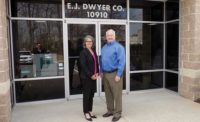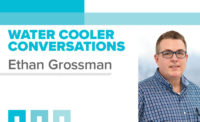Ethan Grossman, P.E., embraces (and hopes fellow and future plumbing engineers do the same) the artistic side of engineering.
“I remember explaining vent design to a colleague and thereafter she would tenderly refer to it as ‘venting voodoo,’” pme’s 2018 Plumbing Engineer of the Year says. “I also remember a colleague who was struggling with the notion there was no formula for fixture units. Plumbing engineering is tied to nature and the seasons. Water changes; it freezes and boils; sometimes it has sewage in it; sometimes it has chemicals in it; sometimes it freezes with sewage in it. Plumbing engineers use their skills to come up with creative solutions.”
He adds: “Plumbing engineering does not always get the top billing because it doesn’t involve the most expensive systems, but I would say it can be most elegant because it revolves around one of the most important and mysterious substances: water.”
Grossman, who leads the plumbing and fire-protection department of interdisciplinary firm SmithGroup’s Boston office, came to the consulting engineering world after spending five years with West Concord, Massachusetts-based manufacturer Hayes Pump as a pump applications engineer.
“It was really great. I learned a lot,” he says of his time at Hayes Pump. “When I started, I was a mechanical seal applications engineer, which is fascinating. It’s interesting when you think about all the things that get pumped and how to provide a seal between the fluid and electrical parts of a pump. You have to seal it.”
Eventually, Grossman wanted to step away from the sales aspects of the job and focus exclusively on the technical and design facets.
“I got my first design job and, thankfully, I still could do AutoCAD from my machinery design days,” he states. “They gave me a little AutoCAD test and I passed. I was doing markups. While I was doing that at the place I worked, my supervisor helped me set goals. One of my goals was going for my P.E., and doing the LEED exam. My supervisor encouraged me to do the CPD, which I was glad I did.”
Getting to work
One of the first things Grossman looks for when coming to a project is whether he will be providing a kitchen in the design. He believes kitchen design provides a good balance of technical and regulatory challenges.
“I like to break out the kitchen design onto its own sheet with its own fixture schedule and details,” he says.
Grossman met these challenges while working on a renovation design of a library at Harvard University. The renovation provided a coffee bar for students and faculty, and Grossman needed to provide a small grease interceptor.
“I wasn’t familiar with the requirement to provide an interceptor for dairy products. I didn’t see it coming,” he recalls. “People can make the argument there’s grease in milk or curd.”
Grossman notes that in the Boston suburb of Burlington — where he lives with his wife, Michelle, and three daughters, Julianna, Catalina and Sofie — the code might be interpreted differently by another local inspector.
“Now, say I design the plumbing system for a cafe in Burlington and when the architect says, ‘We’re going to put in a coffee shop,’” he says. “I’m going to say, ‘You might need a grease interceptor.’ People will say, ‘Really?’ I’ll have to say I saw it (at Harvard).”
Listen to an exclusive podcast with Ethan Grossman
Another major project Grossman was the point design person on is a brand-new athletic complex at Colby College in Waterville, Maine. A grease interceptor was needed because of the concessions, which included hot dogs, nachos and more. Grossman led the charge to work with the city and figure out the requirements.
“The city requires an external grease trap,” he notes. “So I talked to the civil engineer and said, ‘Listen, let’s put our heads together because we might not need to have a big one inside the building and another big one outside. Let’s talk to the town. Plus, maybe it doesn’t make a lot of sense to have a 300-foot kitchen waste run to an external grease interceptor.”
The talks among the principals proved to be fruitful as Waterville agreed to just one internal grease interceptor for the Colby College facility.
“That’s an example of sifting through the regulations and using engineering judgment, what makes sense,” Grossman says.
New guy in town
Grossman now heads up SmithGroup’s plumbing department for its Boston office. SmithGroup was founding in 1853 by Sheldon Smith and has a long history as an architectural firm. Now, SmithGroup is focusing on an integrated practice with multiple disciplines, Grossman explains, which includes a growing engineering group. Grossman expects to grow his staff and help it master plumbing engineering, fire protection and more.
“This environment is a great fit for me to help share my experience,” he says, “and have impact on mentorship and outstanding project outcomes for the clients we serve.”
Mark Brazelle, SmithGroup’s summer intern, enjoyed working alongside Grossman before heading back to the University of Massachusetts-Amherst with a newfound respect for the industry.
“Plumbing engineering wasn’t on my radar before the summer internship,” he says. “However, throughout the summer the members of the department here at SmithGroup have really sparked my interest in the plumbing industry.”
Arup Senior Plumbing Designer William Jiménez worked side-by-side and partnered occasionally with Grossman for four years at the national engineering firm’s Boston office.
“I learned a lot from Ethan,” Jiménez says. “Not just on the technical and design side either. I learned a lot about products. He brought a different set of knowledge from (Hayes Pump) to our field. I took advantage of that.”
Despite working at a different company now, Jiménez appreciates Grossman’s positive attitude and desire to help his fellow colleagues. “I would tell him, ‘I’m draining all the knowledge out of you,’” Jiménez states. “He’s the type of person who was happy to share that knowledge.”
Chris Muskopf, AIA, and an associate principal of Boston-based architectural firm CambridgeSeven, worked with Grossman on a 30,000-square-foot environmental studies building on the Bowdoin College campus in Brunswick, Maine. Muskopf notes Grossman ascended to his main point person among the MEP team throughout the project.
“He was very responsive, but low-key,” Muskopf says. “That makes him very easy to work with through complex situations. He has a good talent of working with the contractors and sub-consultants, everyone on the team, really.”
Muskopf says the Bowdoin College project had high environmental and sustainability standards, including being on track for a LEED Platinum certification. It also required “demonstratively showing how the building systems work.”
“We had to expose everything,” Muskopf says. “We have rainwater harvesting, greywater use and more. We were efficient from the engineering point-of-view, while also showing it off to the building’s users.”
Muskopf highlights Grossman’s work on the irrigation of a vegetative roof after working with CambridgeSeven’s landscape architect.
“He coordinated all the roof drains in a way that worked,” he says. “He’s sensitive to the bigger project goals, the budget and the parameters we worked with.”
ASPE paves the way
Grossman believes he wouldn’t be in his current role at SmithGroup if it weren’t for his long-time membership and activity with ASPE and its Boston Chapter. Grossman joined ASPE right away when he became a plumbing designer in 2005, has been on the National Education Committee and later co-chaired the ASPE Boston Product Show. Paul Taylor, Grossman’s fellow co-chair, now is a colleague at SmithGroup and got Grossman’s name on the list for potential hires when an opening came up.
“ASPE has been very supportive to me,” Grossman says. “When I have had times where I was looking for support or direction, ASPE members have been there to help. I continue to work with ASPE to help support others out of respect to those who have helped me.”
Grossman — who also has guided high-school students through the ACE Mentor Program of America — attends as many ASPE Boston Chapter meetings as possible, enjoying the dinner, socializing and educational sessions.
“Recently, I went to one on pH neutralization tubes coming off condensate from boilers,” he says. “I thought, ‘Oh boy, what’s this going to be about?’ But, it was awesome.”
Laying down a challenge
As a native southern Californian, Grossman grew up with and learned about the importance of “environmental stewardship,” he states. He studied organic farming during his time at the University of California-Santa Cruz and learned quite a lot about the history of farming in California. When Grossman shifted to engineering, his appreciation for the environment grew more and he made sure to carry that into his career.
Grossman is interested in understanding water chemistry more and believes that he “may help advocate for clean drinking water.”
“If we all challenge ourselves to learn more we can expand our ability to help the public,” he states, “whether through energy conservation, safety or efficiency in the construction process. We don’t force ourselves to all be experts in differential equations because we talk to water heater reps, we look at tables and we specify water heaters.”
He adds: “There is an opportunity to make buildings more efficient from an objective point of view and nobody could argue against that. Everybody kind of used to work in their own silos. I think about what engineers have done over the last 15 years or so and we’ve done a lot.”
Keeping it lighthearted
CambridgeSeven’s Muskopf loves Grossman’s story-telling ability and how it helps ease the strains among a large construction team. Muskopf recalls during a particularly tense morning meeting Grossman easing the tension in his own affable way.
“We were at a preconstruction meeting with 40 contractors who were going to start work with an incredibly tight schedule and budget,” Muskopf says. “There were a lot of grim faces and we went around the room introducing ourselves.
“After that was done the owner asks, ‘Any other comments?’ And Ethan proceeds to tell a joke to the whole group, unprompted. It was great because he would later be onsite with these guys. It paved the way for a great relationship with all these guys in the field.”
Grossman’s easy-going personality has proven to be a constant as he seeks projects and ideas that test himself, while he helps the team find the right solution.
“I stay open to new challenges and always look for ways to be helpful to those around me,” he says. “Life is more enjoyable when you have a positive outlook. We all have up-and-down moments. By staying connected, I may be able to help others get through a stressful situation.”







